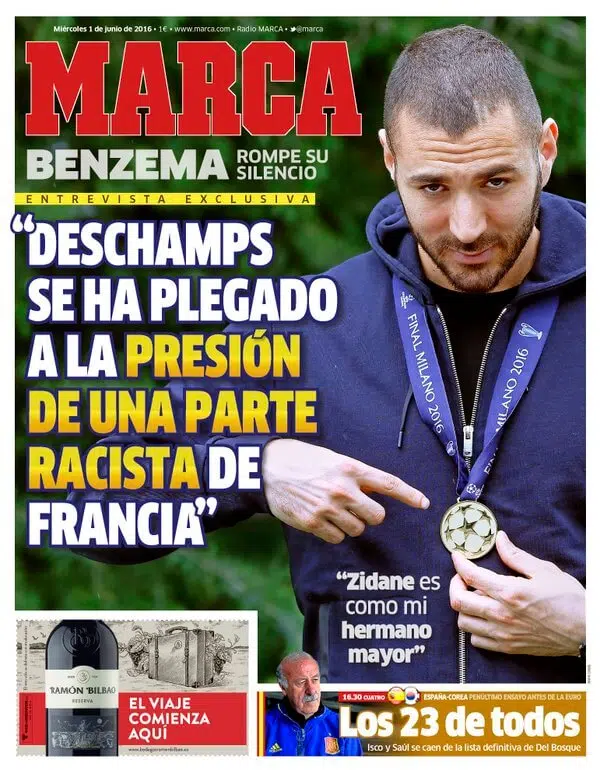
Firstly, it’s an illustration of the hyper-sensitivity with regard to ethnic groups that was rather feeble in France for many decades and that has grown significantly over recent years, reaching a new level in the wake of the terrorist attacks of 2015.
Secondly, it’s a nice example of the mechanisms of ‘moral panic’ which David Ranc described four years ago, at the beginning of another European championship, involving another French top-player, Samir Nasri, who happened to be of North African descent, too.
Thirdly, it is a case in point of what our recent UNESCO report ‘Colour? What Colour?’ described as ‘Racism accusations as rhetorical weapon in the media’. Here’s the excerpt concerned (from section 5.4, page 71): Since racism has been tabooed in mainstream society, accusations of racism have become a rhetorical weapon in public debate. A perfect example of this was provided by the former FIFA president himself in summer 2014. Sepp Blatter responded to different allegations against African members of his organisation by saying:
‘Once again there is a sort of storm against Fifa relating to the Qatar World Cup. Sadly there’s a great deal of discrimination and racism and this hurts me. It really makes me sad.’[1]
Using ‘racism’ against individuals who very clearly have no racist intent is generally counter-productive and results in a devaluation and even trivialisation of the term itself.
In Germany, where for obvious historical reasons the media’s sensitivity to racist and discriminatory discourse is very high, a certain uneasiness is felt with regard to alleged cases of racism that, at close scrutiny, appear artificially construed by specific political groups or social milieus.
According to Ingo von Münch, a reputed professor of constitutional law, racism charges have become a doubtful tool in short-term political conflicts. Used for forming hegemonic or ‘monopolistic’ opinions they threaten to undermine a vital principle of liberal democracies.[2]
Allegations of racism are unfortunately also instrumentalised with the aim of damaging the reputations of persons or influencing ordinary power struggles in football organisations. One may cite the case of Oliver Kahn, who was wrongly accused of having insulted Jonathan Akpoborie in a racist manner.[3] Or the case of Johan Cruyff, who in autumn 2011 allegedly had said to Edgar Davids in an Ajax supervisory board meeting: ‘You are sitting here because you are black’.
Although Cruyff could credibly explain that the context gave the sentence a totally different meaning than the one reported in the press, the racism charges that ensued were difficult to dissipate.[4]
Rather than reinforcing the legitimate fight against racist and discriminatory attitudes, the hasty denunciation of racist or discriminatory discourse – whether based on sincere convictions or cynical instrumentalisation – that eventually turns out to be biased or plain wrong, may have very regrettable counter-productive side-effects.
Media reports on racism and discrimination in football are a double-edged sword: they may raise awareness, but they may also, dilute the fundamental intention and key message of the fight against racism and discrimination by blurring the lines and weakening the semantic effectiveness and weight of the concepts they use.
In other words: by accusing individuals of racism in a non-differentiating manner, they run the risk of damaging the credibility of campaigns and initiatives.
The full report can still be downloaded as PDF here
[1] Owen Gibson, ‘Sepp Blatter launches broadside against the “racist” British media’, The Guardian, 9 June 2014.
[2] Ingo von Münch, Rechtspolitik und Rechtskultur. Kommentare zum Zustand der Bundesrepublik Deutschland. Berlin: Berliner Wissenschafts-Verlag, 2011, p. 212.
[3] Nils Havemann, Samstags um halb 4. Die Geschichte der Fußballbundesliga. Munich: Siedler, 2013, pp. 470f.
[4] ‘Johan Cruyff desmente comentários racistas’, Diario de Noticias, 22 November 2011. See also Ewan Murry, ‘Johan Cruyff explains alleged racist remark towards Edgar Davids’, The Guardian, 22 November 2011.



